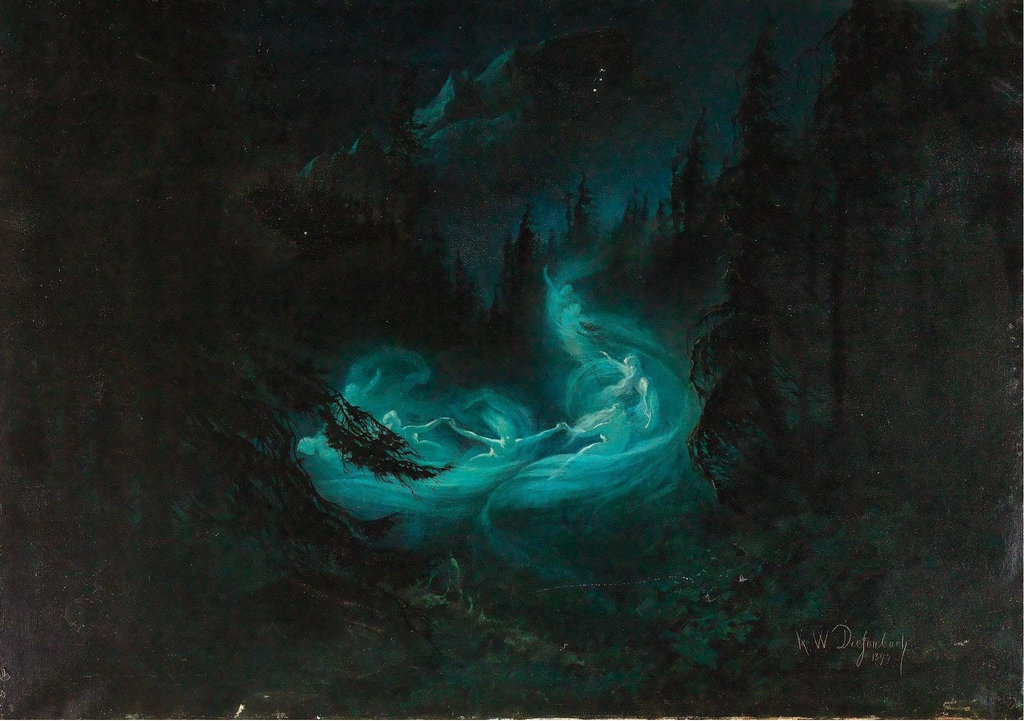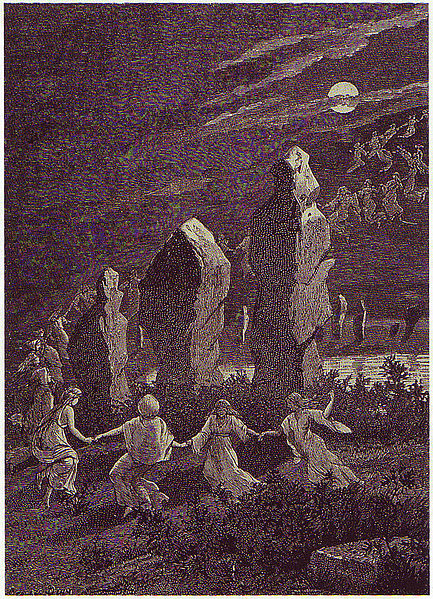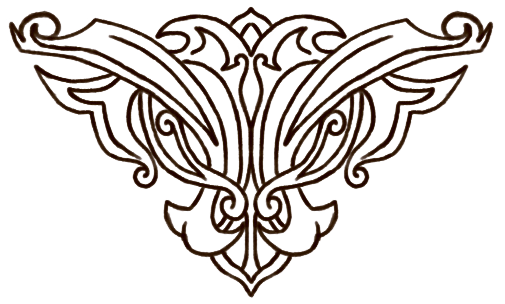An Óstach Scáthanna (Ancient Ferdian: [᚛ᚑᚄᚈᚐᚉᚆ ᚄᚉᚐᚈᚆᚐᚅᚅᚐ᚜])
Or, "when the dark winds rise and the foul spirits dance."
The Wild Dance of the Deranged
If you find yourself roaming the tundra at night, and hear the singing and whistling of the winds, do not come near. Hide behind a rock or in a hovel, and keep yourself out of sight and mind, for the Óstach Scáthanna has come this night. Keep yourself cloaked and cowled, stay away from flickering, and beware any voice that beckons for you to join their dance. Should you choose to ignore these warnings, then only the Gods can save you, pray for your soul that it is not dragged screaming into the afterlife.
Summary
On the longest night of the year, at Mablatha, the evil spirits and unforgiven dead of the world gather to dance and fly through the skies; taking whoever is on their way to the afterlife. Any who do not wish to be sent to an early grave ought to keep behind their doors at night and not wonder out into the abyssal blackness of the night.
It is said that one day, an elderly fisherman did not have enough fish for his all night feast, and that that night his family would join him and his wife in the time honour tradition. Afraid he would offend his guests, and the Spirits, he took his bait, spear, saw and boots, and ran onto the frozen ocean banks to catch himself a seal, or some shaol.
The old man did not heed her warnings, caring more about honour than his life. He ran out into the darkness, and forgot his fire and torch. The snow was strong that night, and the winds rebuked the fisherman, as if warning him to be gone before the moon was too high in the skies. He closed his hood, brandished his spear, and dug into the ice to carve out a hole.
Then, when it was large enough for hunter sharks to jump and bite the bait. He sowed the food and hung the meat, and waited in the snow by the light of the bleak moon for his feast to arrive. Yet in the night, he heard the singing from his village and the bright flickering of flame in the distance. He kept to his hole, and waited for the fish to take bait.
It was then that he heard a whistle. Long and gentle, eager to please, eager to dance, and the winter fog became thickest that night. An Óstach Scáthanna had arrived, and he could see in the mist a hundred devils, ghosts and demons, led by the foulest of creatures the Bugul-Noz. Its hat was wide, its hideous face was cowled, with two fiery eyes that glared through the darkness. With him the ghosts brought food and corpse light, and danced until they made the snows themselves made.
Not willing to be taken to an early grave, the old man leapt into his fishing hole, and hid beneath the ice as the corpse light wisps and hooved korrigans beat their malignant dance across the ice, screaming and yowling, singing and cackling. They smelled man-flesh, they knew he was here, they devoured his bait, and took his spear, and left no kindling for fire afterwards.
For an hour, the old man shivered, he saw the frightening faces of the Dance through the ice and cold and pain, they mocked him and beckoned him to join. They had fire, and warm, and fun for all to see; but the old man lived, and was found frozen and close to death at the next moonrise. Without any fish or food to feast on, he was both shamed, wounded, frightened and frostbitten.
And his guests forgave his dishonour, but warned him to simply let this year by, and offer what he had for them to the Spirits. There is no honour in foolishness, and to dare the Dance for a bit of food is not worth one's life. So do not go out in the blizzard, or go fish in the dark, or leave your home without torchlight, for the Wild Dance will torment you and carry you off if you let them.
Historical Basis
An Óstach Scáthanna is likely a cautionary tale made in An Brenian, where the winter nights are the longest, to warn children and people not to leave their homes during Mablatha, the longest night of the year. During this time, An Tuana meet with their families and spend time from home to home, feasting on the food set aside for this occasion, and forgetting the cold winterland outside.
It is thus important to remind people - old and young - of the dangers that dwell within the cold oceans and the frigid depths of winter. One cannot leave unprepared, or alone, and should they do they'll likely suffer for it. An Óstach Scáthanna is the tale that warns those people to stay indoors, even if one's honor is at risk, in the darkness of the night, for things far fouler than dishonour lie within.
Variations & Mutation
An Óstach Scáthanna is found in the northernmost territories of Aedelwynn, notably in An Brenian, where it is often commonly paired alongside the tale of Bugul-Noz who orchestrates and leads the infernal procession of a thousand dead. In other holds, the Dance is more whimsical, albeit just as dangerous. In An Dalachain, the Dance is closer to a hunting party, whose horn can be held from miles away, with salivating hounds howling its arrival. In An Arwyn, the Dance is a terrifying, brutal horde, hosting abhratach (vampires), revenants and howling wraiths who come banging at the doors of those within.
Legends of An Tuana
La Danse des Korriganes. by L. Dalliance
"I would heed the tales of peasents, were I you. Though their fantasies may be a tad too wild for your taste, their morals and messages are quite important. You would be surprised to know the amount of idiots I've found frozen dead in the wastes, thinking the Dance was not real. I am not too sure myself, albeit I would never brave the frigid cold to investigate."
- Loremaster Muirtach An Dalachain
Date of First Recording
Incredibly old, likely before the Fading Era
Date of Setting
Supposed to happen on the darkest week of the year (Mablatha)
Related Ethnicities
Related Species
Related Organizations
Remove these ads. Join the Worldbuilders Guild






Comments